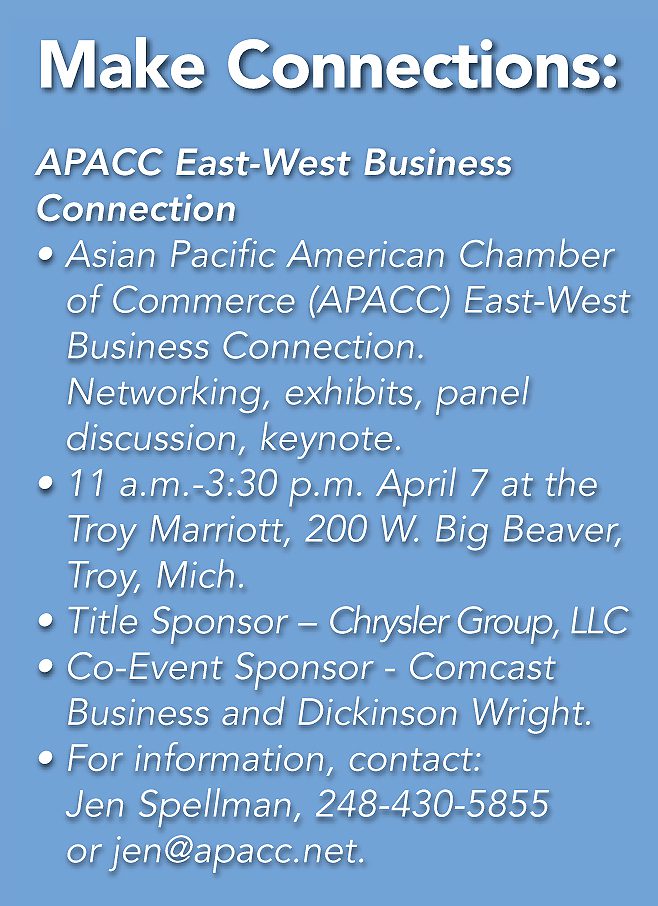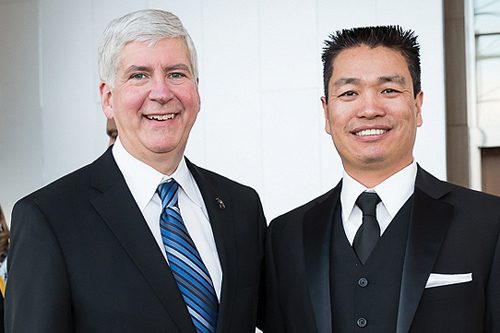

For the same reason that artists have relocated to Detroit to buy inexpensive studio space, Chinese investors are taking advantage of good deals across Michigan.
The state offers opportunities that allow Chinese companies to expand globally, experts say. Michigan, the automotive center of North America, also offers low real-estate prices and skilled workers in need of jobs.
“The bilateral Chinese-U.S. business relations in the coming five to 15 years are vital,” said Tom Watkins, a longtime advocate for international trade relations and an adviser to the Michigan Economic Development Corporation and Detroit Chinese Business Association.
“The China way is coming. Michigan business leaders can be swamped by it or they can ride the wave and benefit from it,” Watkins said.
Some facts to consider:
• In 2012, the cumulative Chinese investment in Michigan surpassed $1 billion.
• There are 15,000 Mandarin speaking engineers in Michigan.
• Some 96 percent of Chinese investment in Michigan is in manufacturing.
• In the United States the total Chinese investment amount has reached $35.9 billion.
Watkins said that in the past few years, 400 million people in China have moved from poverty to the middle class. For centuries, China was the largest economy in the world; it has only been in the last two centuries that the United States and Britain have surpassed them.
“The Chinese are poised to be tremendous consumers right now,” Watkins said. “They will buy.”
Automotive investments top the charts with the majority of Chinese investments in Michigan being manufacturing and automotive related.
Making a positive impact
The start of Chinese interest in Michigan came when Gov. Rick Snyder placed a focus on global investment, specifically Chinese, Watkins said. Since taking office, Snyder has taken six mission trips to outside countries in order to continue building relations with possible investors.

“Engaging globally is a smart, good thing to do,” Snyder said in his keynote address at the Detroit Chinese Business Association Chinese New Year gala Feb. 27. “You can make a difference in Michigan by creating an environment for success and letting businesses work in a positive way.”
Adds Watkins, “The Chinese companies will start in their home country. As their companies grow they will need someplace to expand to and they will come here, to Michigan, the second largest auto market in the world.”
One reason investment has grown is because of real estate, observers noted.
“China is expensive. Properties are really cheap here in Michigan,” said Van Nguyen, executive director of the Asian Pacific American Chamber of Commerce in Troy.
Some fear immigrant investors will take away jobs from Michigan workers. That is not the case, Nguyen said. She believes Chinese investments will create jobs.
“Some investors shy away from investing their resources into international business believing that it’s risky and complicated,” said Nguyen.
“China is currently the United States’ second largest trading partner, and Michigan is attractive to Chinese investors. Michigan offers vast opportunities for entrepreneurs to invest and stay in Michigan,” said Nguyen.

The Asian Pacific American Chamber of Commerce hosts East-West conferences linking suppliers and investors from the Pacific Rim with their Michigan counterparts. In October, for example, APACC held the U.S.-China Automotive Die and Molding Industry Technology and Trade Conference. On April 7, it will host its East-West Business Connection.
APACC believes that fostering relationships strengthens a business relationship by providing a forum for networking, mentoring and consultation between businesses, Nguyen said.
Watkins believes Michigan needs to focus on how it can be attractive for possible investors rather than worry about imagined job poaching.
“While other governors are anti-immigrant, Snyder has put out the welcome mat to highly educated immigrants. This move will create jobs and wealth,” Watkins said. “This will benefit Michigan workers as Chinese investors will hire Michigan workers, not Chinese workers.”
“We have everything the Chinese need,” said Watkins. “We have universities, clean air and undervalued property.”
Investors will come if they know they are wanted, Watkins added.
“We need to nurture these relationships in order to develop longstanding partnerships,” said Watkins. “Not only do we need to initially attract investors, but we need to make our state someplace where they will want to stay to raise their family. The Chinese understand that the governor, Michigan’s top leader, is opening his arms to them and that is a big deal.”
The auto industry
In addition to creating manufacturing jobs, Chinese auto companies will need other Michigan manufacturers in place to work with here.
 “If you dissect a car, there are so many parts. Many are made here. Chinese companies will need an expanding base of suppliers to be able to build and assemble a complete car in Michigan,” Watkins said.
“If you dissect a car, there are so many parts. Many are made here. Chinese companies will need an expanding base of suppliers to be able to build and assemble a complete car in Michigan,” Watkins said.
“This creates a domino effect. Every time a business is attracted to Michigan, it creates the potential to add billions to the community. One dollar has an eight-fold increase,” Watkins said.
A single company, whether automotive or not, needs other area companies to function. Each company needs a paper supplier, janitorial services and office staff, just to list a few. Growth and development will increase in Michigan from just one company, Watkins added.
“Plus, everything that can spin off of the automotive investment,” said Watkins. “Agriculture, tourism, gambling, golf – things people want and need where they live. Chinese immigrants could buy a golf course in Michigan for the price that five people would pay to just belong to a golf club in China.”
“It could cost over a million dollars for an apartment in Shanghai. Think of what that amount of money could buy in Michigan. America is a magnet for Chinese investment right now.”
Michigan would be smart to think internationally, Nguyen said.
“By the state of Michigan embracing this global view, it will not only benefit the local Michigan businesses, but bring economic growth as a whole to the great state of Michigan,” said Nguyen.
Through Synder’s plan, immigrant investors can get a greencard for themselves and their family.
“Ultimately, I predict we will see a China car company building cars in America within the next decade,” said Watkins.
Chinese investment overall, compared with foreign investments from other countries such as Canada, England and Germany, is small, experts said. And that leaves room for exponential growth.
“Michigan is now the 8th or 9th largest state in terms of total amount of investment attracted cumulatively (from China),” said Brian Connors, the Michigan Economic Development Corporation (MEDC) China business attraction manager.

for the Michigan Economic Development Corporation.
“Chinese foreign direct investment is growing more rapidly than other countries – they are the world’s second largest economy right now,” Connors said.
Connors contributed this growth to Michigan’s dominant industry base for advanced manufacturing and automotive manufacturing.
“At the MEDC, we are happy to see just about any country creating jobs in Michigan as long as the company doesn’t pose a threat to Michigan’s interest, which China has not,” said Connors.
“It’s been an exponentially increasing amount of investment that started from a very small amount. Around 2009, we started seeing significant growth of Chinese investment,” he said.
In 2012, the total amount of cumulative Chinese investment in Michigan surpassed $1 billion for the first time. In the United States, the total Chinese investment amount has hit $35.9 billion, according to the Rhodium Group Chinese investment monitor.
“The Chinese are creating more and better jobs with the concentration in southeast Michigan, where there are several notable Chinese companies located, as well as some acquisitions,” said Connors.
Nexteer Automotive in Saginaw, Johnson Controls Inc. throughout Michigan and BWI Lansing LLC in Eaton Rapids, are three major Chinese acquisitions in Michigan, said Connors.
“Then there are the investors who built something completely new. Greenfield Lincoln Investments in Oak Park built a new factory out of nothing,” said Connors. “They created jobs that were not there previously. That is totally positive.”
Yanfeng USA Automotive in Harrison Township and Warren created roughly 250 jobs and is still growing.
Another example is Fuyao North America Inc. in Oakland County, where 200 new Michigan jobs were created.
“It is easy to see that jobs were created when new businesses were created, but as for the acquisitions a significant number of Michigan jobs have been created as well,” said Connors. “The Chinese investors are interested in operating successfully in Michigan’s market.”
In October, Mark Kinsler, vice president of International Business Attraction at the MEDC, said more than 100 Chinese companies have set up in Michigan. And the list keeps growing.
Other Chinese investments
In addition to automotive investment, Michigan has seen Chinese investment in real estate, among other areas.
“China is our largest trading partner out of NAFTA already,” said Jerry Xu, president of the Detroit Chinese Business Association in Troy. “Chinese investors are investing overseas, hungry for opportunities such as real estate, energy and technology, which we can provide here in Michigan.”

The former Detroit Free Press and David Stott buildings in Detroit were recently bought by the Shanghai-based Dongdu International Group, said Watkins.
“The group plans on developing the former Free Press building into a $50 million apartment and retail complex,” said Watkins.
“Compared with China, investing in real estate like that is cheap in Michigan, and it’s a perfect time to do so in Detroit because people are moving back to the city,” he said. “The group paid $9.4 million for the David Stott building and $4.2 million for the Free Press building.”
Watkins also pointed out that America is a magnet for Chinese students looking for a top education.
“The immigrant students are willing to pay substantial tuition fees since they are immigrants,” said Watkins. “We have also found that those students tend to stay here and use their skills to better Michigan.”
Xu said that medical technology in the United States also lures immigrants.
“The Chinese are becoming increasingly wealthy and are choosing our medical services as a great fit for them,” said Xu. “Chinese patients in Michigan mean more consumers of our medical services.”
The third catch that can draw Chinese interest is our land, investment in farms, and crops.
“China is going through its industrial revolution right now,” said Watkins. “The pollution is terrible. They are interested in the fresh produce we have to offer.”
How to get involved
Going back to Watkin’s philosophy of riding the wave of Chinese investment, already established Michigan businesses can take advantage of the potential opportunities that Chinese investment in Michigan presents.

For example, Michigan businesses have the opportunity to partner with Chinese manufacturing companies by acting as suppliers and buyers.
Watkins mentioned that it takes many different companies to build a car, and that the majority of Chinese investments are automotive based.
“I would first encourage Michigan businesses to participate in the Detroit Chinese Business Association,” said Watkins. “They organize events that match Chinese business with Western businesses, so that once Chinese companies come to Michigan a relationship will already be established and they might be more likely to buy parts from the company that already worked to form a relationship over another one.”
Even companies that aren’t automotive based are encouraged to already form relationships, join the DCBA and be a familiar name to potential investors.
“There are a number of steps Michigan businesses can take,” Snyder said after the keynote. “Trade missions have been effective. We have paralleled two dozen Michigan companies with potential Chinese customers and suppliers. By the end of one mission trip new business relationships had already been made.”
Watkins understands how expansive a single business can be.
“These companies need suppliers in Michigan as well as marketing talents, lawyers and office staff,” said Watkins.
“A new company, which brings new residents, they need everything to start up,” said Watkins. “These businesses aren’t going to bring their staff and materials with them, the investors will find all of that in Michigan, or wherever they decide to invest.”
 The biggest way that Michigan companies can benefit from Chinese investment is by building strong and welcoming relationships with them.
The biggest way that Michigan companies can benefit from Chinese investment is by building strong and welcoming relationships with them.
“There is nothing special about Chinese investment over any other country investing,” said Watkins. “We just have to recognize that China is the next growing investor in Michigan and if we want their investments to be sustainable we have to invest in them by building those connections.”
Xu said Michigan needs to promote itself and reach out to investors and show Chinese investors they are wanted.
In order to create an inviting culture for Chinese investors “we need to connect with them by understanding their language and our cultural differences,” said Xu.
“The Detroit Chinese Business Association is a great platform to connect both Michigan and China in the business world,” said Xu. “We host events that allow both sides to meet, mingle, to make friends and to do business.”
“It is not easy for someone to come from another country and start up a business,” said Nguyen. “It is a lot easier and safer if you already have established a connection in Michigan and get a foot holding so you already have suppliers and staffing lined up.”
Nguyen said that staffing companies can benefit from making relations with Chinese investors as well so once the company comes to Michigan, the investor can quickly get workers lined up.
Chinese companies will “pitch to an American company,” said Nguyen, “because many businesses are involved in one business.”
Watkins said that the Chinese philosophy is to look at the next decade, not just the next quarter like many companies in Michigan do.
“The Chinese are aware of the time it takes to foster a successful business. They are not going to just scrape together a couple bucks and throw up a building,” said Watkins. “They have the money to back a successful business. This is where Michigan is headed.”








